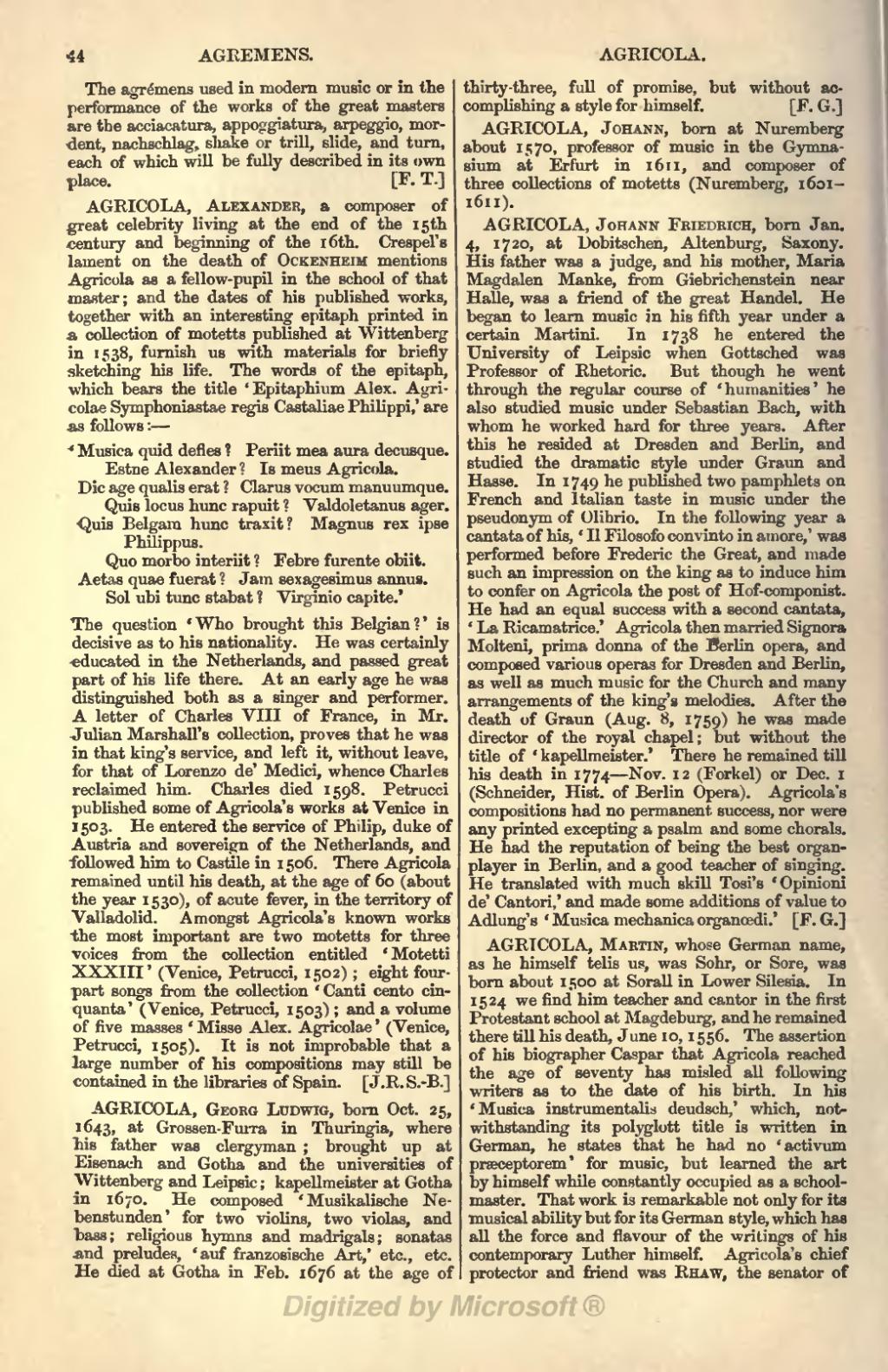The agrémens used in modern music or in the performance of the works of the great masters are the acciacatura, appoggiatura, arpeggio, mordent, nachschlag, shake or trill, slide, and turn, each of which will be fully described in its own place.
AGRICOLA, Alexander, a composer of great celebrity living at the end of the 15th century and beginning of the 16th. Crespel's lament on the death of Ockenheim mentions Agricola as a fellow-pupil in the school of that master; and the dates of his published works, together with an interesting epitaph printed in a collection of motetts published at Wittenberg in 1538, furnish us with materials for briefly sketching his life. The words of the epitaph, which bears the title 'Epitaphium Alex. Agricolae Symphoniastae regis Castaliae [App. p.519 "Castiliae"] Philippi,' are as follows:—
'Musica quid defles? Periit mea aura [App. p.519 "cura"] decusque.
Estne Alexander? Is meus Agricola.
Dic age qualis erat? Clarus vocum manuumque.
Quis locus hunc rapuit? Valdoletanus ager.
Quis Belgam hunc [App. p.519 "huc"] traxit? Magnus rex ipse Philippus.
Quo morbo interiit? Febre furente obiit.
Aetas quae fuerat? Jam sexagesimus annus.
Sol ubi tunc stabat? Virginio [App. p.519 "in"] capite.'
The question 'Who brought this Belgian?' is decisive as to his nationality. He was certainly educated in the Netherlands, and passed great part of his life there. At an early age he was distinguished both as a singer and performer. A letter of Charles VIII of France, in Mr. Julian Marshall's collection, proves that he was in that king's service, and left it, without leave, for that of Lorenzo de' Medici, whence Charles reclaimed him. Charles died 1598 [App. p.519 "1498"]. Petrucci published some of Agricola's works at Venice in 1503. He entered the service of Philip, duke of Austria and sovereign of the Netherlands, and followed him to Castile in 1506. There Agricola remained until his death, at the age of 60 (about the year 1530), of acute fever, in the territory of Valladolid. Amongst Agricola's known works the most important are two motetts for three voices from the collection entitled 'Motetti XXXIII' (Venice, Petrucci, 1502); eight four-part songs from the collection 'Canti cento cinquanta' (Venice, Petrucci, 1503); and a volume of five masses 'Misse Alex. Agricolae' (Venice, Petrucci, 1505). It is not improbable that a large number of his compositions may still be contained in the libraries of Spain.
AGRICOLA, Georg Ludwig, born Oct. 25, 1643, at Grossen-Furra in Thuringia, where his father was clergyman; brought up at Eisenach and Gotha and the universities of Wittenberg and Leipsic; kapellmeister at Gotha in 1670. He composed 'Musikalische Nebenstunden' for two violins, two violas, and bass; religious hymns and madrigals; sonatas and preludes, 'auf franzosische Art,' etc., etc. He died at Gotha in Feb. 1676 at the age of thirty-three, full of promise, but without accomplishing a style for himself.
AGRICOLA, Johann, born at Nuremberg about 1570, professor of music in the Gymnasium at Erfurt in 1611, and composer of three collections of motetts {Nuremberg, 1601–1611).
AGRICOLA, Johann Friedrich, born Jan. 4, 1720, at Dobitschen, Altenburg, Saxony. His father was a judge, and his mother, Maria Magdalen Manke, from Giebrichenstein near Halle, was a friend of the great Handel. He began to learn music in his fifth year under a certain Martini. In 1738 he entered the University of Leipsic when Gottsched was Professor of Rhetoric. But though he went through the regular course of 'humanities' he also studied music under Sebastian Bach, with whom he worked hard for three years. After this he resided at Dresden and Berlin, and studied the dramatic style under Graun and Hasse. In 1749 he published two pamphlets on French and Italian taste in music under the pseudonym of Olibrio. In the following year a cantata of his, 'Il Filosofo convinto in amore,' was performed before Frederic the Great, and made such an impression on the king as to induce him to confer on Agricola the post of Hof-componist. He had an equal success with a second cantata, 'La Ricamatrice.' Agricola then married Signora Molteni, prima donna of the Berlin opera, and composed various operas for Dresden and Berlin, as well as much music for the Church and many arrangements of the king's melodies. After the death of Graun (Aug. 8, 1759) he was made director of the royal chapel; but without the title of 'kapellmeister.' There he remained till his death in 1774—Nov. 12 (Forkel) or Dec. 1 (Schneider, Hist. of Berlin Opera). Agricola's compositions had no permanent success, nor were any printed excepting a psalm and some chorals. He had the reputation of being the best organ-player in Berlin, and a good teacher of singing. He translated with much skill Tosi's 'Opinioni de' Cantori,' and made some additions of value to Adlung's 'Musica mechanica organœdi.'
AGRICOLA, Martin, whose German name, as he himself tells us, was Sohr, or Sore, was born about 1500 at Sorall in Lower Silesia. In 1524 we find him teacher and cantor in the first Protestant school at Magdeburg, and he remained there till his death, June 10, 1556. The assertion of his biographer Caspar that Agricola reached the age of seventy has misled all following writers as to the date of his birth. In his 'Musica instrumentalis deudsch,' which, notwithstanding its polyglott title is written in German, he states that he had no 'activum præceptorem' for music, but learned the art by himself while constantly occupied as a schoolmaster. That work is remarkable not only for its musical ability but for its German style, which has all the force and flavour of the writings of his contemporary Luther himself. Agricola's chief protector and friend was Rhaw, the senator of
